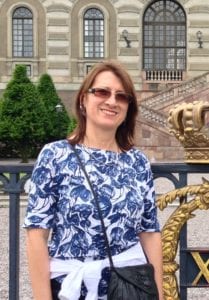
General Director
Instituto Nacional de Ciencias Neurologicas, Lima, Peru
ASHG: What are specific challenges faced by clinicians who also want to have a research career in genetics?
Dr. Mazzetti: In Peru, there are few genetics residency training program; I am a neurologist and there are no formal ways to go from neurology to neurogenetics. We have developed the training by ourselves, looking for opportunities in genetics inside our country (which are scarce), and abroad. We created a neurogenetics profile adapted to what we think are the needs of our country and have learned much from experiences and our mistakes.
In the neurogenetics subspecialty, there is no formal way to work in our health system and to work inside an institution that belongs to the Ministry of Health, so we have built our own way of being recognized inside the system and have established that our work is sustained by research applied to our clinical work.
In our country the number of patients seeking medical attention is overwhelming. We deal with rare diseases with scarce personnel and only recently has our country promulgated a law on rare diseases which helps formally consolidate our previous work. Like other Latin American countries, much of the work done has moved forward due to personal involvement and effort on behalf of the health personnel involved and their patients’ needs. Our health system is not prepared for rare diseases but our team has been working on them with a global health perspective.
ASHG: What do you think the future holds for the field of genetics?
Dr. Mazzetti: Neurogenetics in Peru is an open field with an overwhelming amount to be done. While economic and technological resources are scarce, the amount of people affected by neurogenetic diseases and their families are abundant.
The Neurogenetics Research Center is comprised of several highly motivated people who are eager to work; however, there are few who officially belong to our health system, the remaining are associated through research without formal pay. In spite of this, there is a large field to develop and people to involve with it.
As the health system is beginning to organize and acknowledge rare diseases, we have a huge opportunity to build a neurogenetics division that is cost-effective, sustainable, adapted to our national needs, and is able to serve the entire country through the national institute. CONCYTEC, a government regulated institute in charge of supporting and supervising research in the country, is now encouraging basic research and offering funding to researchers interested.
Building a neurogenetics network is just beginning but it is one of our most desired objectives, which can change the way things are done in our country.
ASHG: What are your favorite and least favorite parts of your job?
Dr. Mazzetti: Since little has been done in our country in regards to genetic diseases, anything we do makes a big change and this is rewarding; however, research is still typically an unpaid activity that is completed on spare time after attending to the daily patient population.
The genetics research perspective is changing the way in which our clinical work is performed. Affected persons and their families are eager to collaborate and give valuable input including their experiences and what they need from us. We don’t like to work alone; however, there is nobody to discuss our problems in the molecular and clinical aspects of neurogenetics in Peru, making it impossible to compare our work, which in turn gives us a false sense of security.
It is very hard to publish outside the country because of the high standards required by journals. Being able to reach international clinical and laboratory standards is such a far off objective that it becomes quite depressing. Despite these drawbacks, we are very proud of being able to perform research despite the difficult conditions.
ASHG: How important do you think it is to have a mentor in your field? What do you think are important qualities in an effective mentor?
Dr. Mazzetti: Ever since I was a second year medical student, I’ve had the opportunity to find a mentor in a renowned Peruvian neurologist. Since then, my mentor helped me to become a physician focused on the needs of our patients, their physiopathology, the importance of being constantly updated on the latest medical information, to keep an eye on what happens in neurology outside of Peru, and basically into becoming an empathic human being.
I think that an effective mentor is someone capable of guiding you as a person and as a physician, always present to hear you, able to tell you what you don’t want to hear and able to push you to the limits and beyond.
Want more interviews? Join the ASHG Trainee Forum to keep up with new ones!
